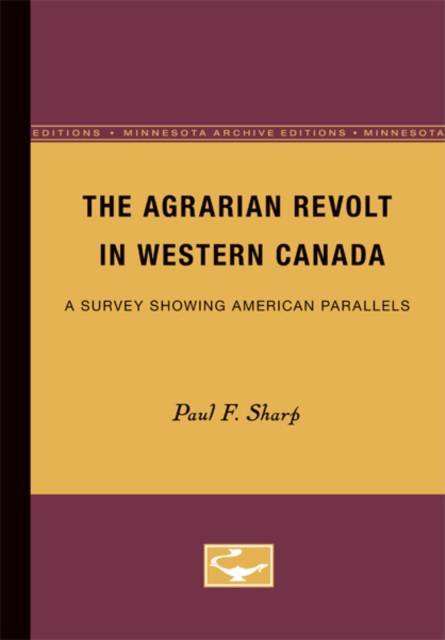
- Retrait gratuit dans votre magasin Club
- 7.000.000 titres dans notre catalogue
- Payer en toute sécurité
- Toujours un magasin près de chez vous
- Retrait gratuit dans votre magasin Club
- 7.000.0000 titres dans notre catalogue
- Payer en toute sécurité
- Toujours un magasin près de chez vous
The Agrarian Revolt in Western Canada
A Survey Showing American Parallels
Paul Sharp
Livre broché | Anglais
62,95 €
+ 125 points
Description
The Agrarian Revolt in Western Canada was first published in 1948. A revised edition appeared in 1997.In the 1940s, two American graduate students travelled to the prairie provinces to research Canadian farm movements. One was Seymour Martin Lipset and the other was Paul F. Sharp. Subsequently, their revised dissertations were published as books. Lipset's Agrarian Socialism (1950), a sociological study of Saskatchewan's Cooperative Commonwealth (CCF), is the better known of the two and has remained the point of departure for scholarship on the CCF ever since. Though not as frequently cited, Sharp's Agrarian Revolt in Western Canada is the standard work on its topic as well.It explores the history of agrarian insurgency in the prairie provinces from the turn of the century until the Depression of the 1930s. From Sharp's perspective, his work outlined the background of both Alberta's Social Credit and Saskatchewan's CCF. What made it provocative at the time was its emphasis upon American influences in these earlier movements. Virtually all reviewers acknowledged its contribution, and W. L. Morton offered a particularly enthusiastic assessment of its merits. The Agrarian Revolt in Western Canada provides an essential understanding of the development of agrarian movements in the prairie provinces, and a very useful perspective on such efforts south of the forty-ninth parallel.In honour of the fiftieth anniversary of the publication of The Agrarian Revolt in Western Canada, the Canadian Plains Research Center is pleased to make this seminal study available once more to students of both the Canadian and American farm movements. New introductions by Professors William Pratt (University of Nebraska, Omaha) and Lorne Brown (University of Regina) examine Sharp's legacy from a contemporary American and Canadian perspective respectively.
Spécifications
Parties prenantes
- Auteur(s) :
- Editeur:
Contenu
- Nombre de pages :
- 216
- Langue:
- Anglais
Caractéristiques
- EAN:
- 9780816669363
- Date de parution :
- 01-01-48
- Format:
- Livre broché
- Format numérique:
- Trade paperback (VS)
- Dimensions :
- 149 mm x 229 mm

Les avis
Nous publions uniquement les avis qui respectent les conditions requises. Consultez nos conditions pour les avis.






